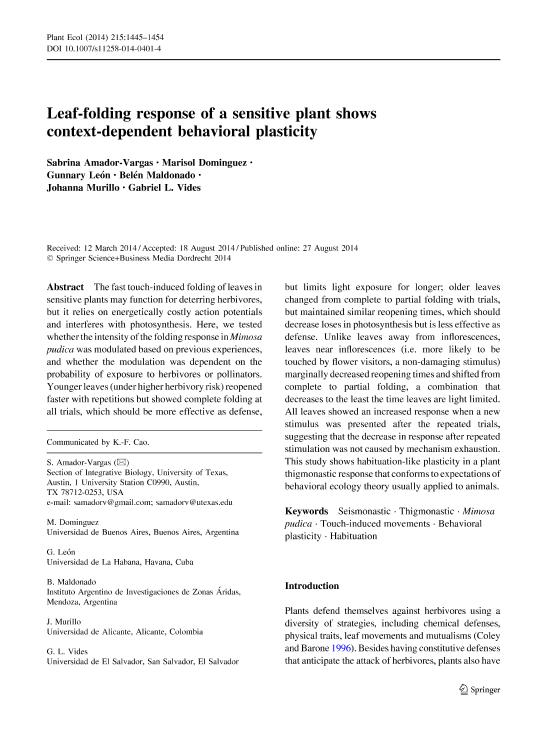Mostrar el registro sencillo del ítem
dc.contributor.author
Amador Vargas, Sabrina
dc.contributor.author
Dominguez, Marisol

dc.contributor.author
León, Gunnary
dc.contributor.author
Maldonado, María Belén

dc.contributor.author
Murillo, Johanna
dc.contributor.author
Vides, Gabriel L.
dc.date.available
2017-07-18T21:37:33Z
dc.date.issued
2014-08
dc.identifier.citation
Amador Vargas, Sabrina; Dominguez, Marisol; León, Gunnary; Maldonado, María Belén; Murillo, Johanna; et al.; Leaf-folding response of a sensitive plant shows context-dependent behavioral plasticity; Springer; Plant Ecology; 215; 12; 8-2014; 1445-1454
dc.identifier.issn
1385-0237
dc.identifier.uri
http://hdl.handle.net/11336/20900
dc.description.abstract
The fast touch-induced folding of leaves in sensitive plants may function for deterring herbivores, but it relies on energetically costly action potentials and interferes with photosynthesis. Here, we tested whether the intensity of the folding response in Mimosa pudica was modulated based on previous experiences, and whether the modulation was dependent on the probability of exposure to herbivores or pollinators. Younger leaves (under higher herbivory risk) reopened faster with repetitions but showed complete folding at all trials, which should be more effective as defense, but limits light exposure for longer; older leaves changed from complete to partial folding with trials, but maintained similar reopening times, which should decrease loses in photosynthesis but is less effective as defense. Unlike leaves away from inflorescences, leaves near inflorescences (i.e. more likely to be touched by flower visitors, a non-damaging stimulus) marginally decreased reopening times and shifted from complete to partial folding, a combination that decreases to the least the time leaves are light limited. All leaves showed an increased response when a new stimulus was presented after the repeated trials, suggesting that the decrease in response after repeated stimulation was not caused by mechanism exhaustion. This study shows habituation-like plasticity in a plant thigmonastic response that conforms to expectations of behavioral ecology theory usually applied to animals.
dc.format
application/pdf
dc.language.iso
eng
dc.publisher
Springer

dc.rights
info:eu-repo/semantics/openAccess
dc.rights.uri
https://creativecommons.org/licenses/by-nc-sa/2.5/ar/
dc.subject
Seismonastic
dc.subject
Thigmonastic
dc.subject
Mimosa Pudica
dc.subject
Touch-Induced Movements
dc.subject.classification
Ecología

dc.subject.classification
Ciencias Biológicas

dc.subject.classification
CIENCIAS NATURALES Y EXACTAS

dc.title
Leaf-folding response of a sensitive plant shows context-dependent behavioral plasticity
dc.type
info:eu-repo/semantics/article
dc.type
info:ar-repo/semantics/artículo
dc.type
info:eu-repo/semantics/publishedVersion
dc.date.updated
2017-07-05T15:04:17Z
dc.identifier.eissn
1573-5052
dc.journal.volume
215
dc.journal.number
12
dc.journal.pagination
1445-1454
dc.journal.pais
Países Bajos

dc.journal.ciudad
Dordrecht
dc.description.fil
Fil: Amador Vargas, Sabrina. University of Texas; Estados Unidos
dc.description.fil
Fil: Dominguez, Marisol. Universidad de Buenos Aires; Argentina. Consejo Nacional de Investigaciones Científicas y Técnicas; Argentina
dc.description.fil
Fil: León, Gunnary. Universidad de la Habana; Cuba
dc.description.fil
Fil: Maldonado, María Belén. Consejo Nacional de Investigaciones Científicas y Técnicas. Centro Científico Tecnológico Conicet - Mendoza. Instituto Argentino de Investigaciones de Las Zonas Aridas. Provincia de Mendoza. Instituto Argentino de Investigaciones de Las Zonas Aridas. Universidad Nacional de Cuyo. Instituto Argentino de Investigaciones de Las Zonas Aridas; Argentina
dc.description.fil
Fil: Murillo, Johanna. Universidad de Alicante; España
dc.description.fil
Fil: Vides, Gabriel L.. Universidad de El Salvador; El Salvador
dc.journal.title
Plant Ecology

dc.relation.alternativeid
info:eu-repo/semantics/altIdentifier/doi/http://dx.doi.org/10.1007/s11258-014-0401-4
dc.relation.alternativeid
info:eu-repo/semantics/altIdentifier/url/https://link.springer.com/article/10.1007%2Fs11258-014-0401-4
Archivos asociados
